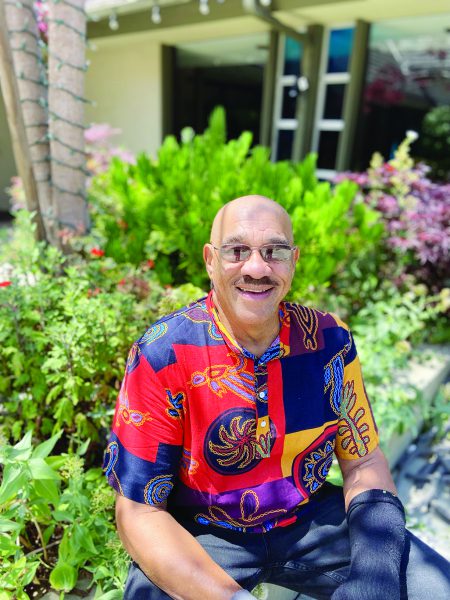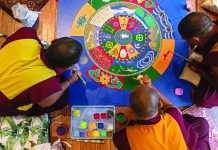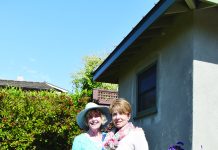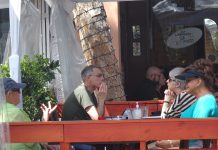
By Barbara McMurray, Special to the Independent
A temporary art exhibition designed to save Black and brown lives is part of Laguna Beach’s observation of Juneteenth. This day became a federal holiday in 2021 and has long been celebrated by African Americans as the end of enslavement.
Los Angeles artist and former business owner Eugene Warren’s oversize sculptures titled “A Guide for African Americans: How to Survive a Police Stop” includes step-by-step procedural instructions for drivers of color, especially young men, encouraging clarity in conversational exchange. His goal is to reduce shootings that arise out of the fear he believes impels many law enforcement officers to draw a firearm and cause irreparable harm. The larger of Warren’s two sizeable mixed media pieces shows an American flag with a large police cruiser dominating its stripes. Its stars are portraits memorializing 50 Black and brown people killed during police encounters. The other is text explaining how to stay alive and unharmed in what can be a fraught and stressful encounter for both driver and officer.
Black Californians were stopped by police officers much more frequently than other racial groups, and police were more likely to use force against them, according to an analysis of records provided to the California Department of Justice. The data evaluated 1.8 million people stopped in 2018 by the eight largest police agencies in California. The study confirmed that Black people are much more likely to have firearms pointed at them by police officers and are more likely to be detained, handcuffed, and searched. At the same time, when the police search Black, Latino and Native American people, they are less likely to find drugs, weapons or other contraband than when they search white people.
A lifelong South-Central LA resident, Warren witnessed the race riots of 1964 and 1992.
“I saw the social, cultural, and racial changes that transpired through the decades in Los Angeles,” Warren said. “Being a Black man, I experienced some issues with police pulling me over. Back in the 60s, men had natural hairstyles that were easy to spot. I’ve been handcuffed for no reason and accused of stealing my own car. With all the turmoil that’s happened because of police interactions with Black and brown people – I wanted to do something that brings attention to this. I also did it as a memorial for those who didn’t survive those encounters.”
Warren, 73, always had a creative side. He took art classes in junior college, learning photography, painting and silk screen printing. He completed a Los Angeles City College technical engineering program. He learned under his father, an electrical contractor, to be an electrician, then worked for a decade as a technical representative for Xerox Corporation. Warren ran his own business working on copiers before spending 15 years as an investigator aide with the LA County Probation Department.
“I’ve always loved to build things and work with my hands. I was involved in science fairs in high school,” Warren said. At the height of the 60s psychedelia fad, he designed and sold blacklight posters, printing them in the family’s garage. Warren helped introduce the African American holiday Kwanzaa to the Los Angeles-Compton area, with its precepts that include unity, self-determination, collective work and responsibility. His work is grounded in a desire to protect and educate his community.
“The narrative basically is a procedure, and if people would follow this, it would reduce the possibility of their being in a situation where they can be killed or injured,” Warren noted.
What about the counterargument that a traffic stop shooting by an officer would not have happened had the victim complied?
“It’s very complex,” he said. “The younger people give me pushback, but once they understand that all they are trying to do is survive the police stop, they realize it might be in their best interest. I hope they might recall some of this instruction if they are ever in a situation. Don’t reach for anything. Be polite to the officer even if they’re not polite to you.”
He said that because officers are trained to be the authority in control of a situation, courtesy from an officer is not a given.
“It’s about communicating clearly to reduce an officer’s fears. They have a hard job to do. They’re trying to get home to their families. I want people to know what to do to lessen the nervousness.”
Warren even made a three-minute online video to drive home what he wants every motorist, especially men of color, to know and remember if stopped by an officer.
“As a Black man in America, you must take precautions,” he said. “We need to keep educating ourselves. All of us. The finger always points to the officers, but it’s on all of us to ensure our lives are protected. We need to gain the wisdom to understand how implicit bias affects everyone. We all must talk about this. Police agencies are trying to combat this by training offers on implicit bias. Still, many don’t have the budget for such training. And trained officers often move on,” so it has to be a constant effort – but usually isn’t.
“My art piece will educate Black and brown people, and many law enforcement officers might even like the idea of having this education occur.”
He would like to display “A Guide for African Americans: How to Survive a Police Stop” in various galleries, “but it’s not exactly ‘gallery-friendly,’” he said. However, the art was part of a May 2022 exhibition for the 30th anniversary of the nonprofit Community Coalition, founded in the late 1980s by LA Mayor Karen Bass, at the time a physician’s assistant. It was also shown at a Black Entrepreneurs Expo at USC in 2021.
Married to his wife Linda for 44 years, Warren enjoys family time with his two adult children and seven grandchildren. He’s working on some new abstract paintings. “And they have nothing to do with any social statements,” he chuckled.
Warren’s and quilt artist Allison Allen’s art will be displayed at the church weekdays through June 30 from 11 a.m. to 2 p.m. Admission is free.
Juneteenth Jubilee Events
Laguna’s second year of Juneteenth Jubilee events, co-presented by the Laguna Beach Cultural Center and Neighborhood Congregational Church, conclude on Saturday, June 24 at the church’s Bridge Hall. Artist Eugene Warren will be present to discuss his art and answer questions.
At 5:30 p.m., guests are invited to enjoy a Tibetan meal prepared by chefs Nawang Jungtuktsang of Cafe Zambala in Emeryville and Tenpa Dorjee of Tibet Handicrafts in Laguna Beach.
At 6 p.m., the four powerful female voices of Los Angeles Black group VISION will perform a soul-stirring concert. Tickets to the dinner and performance are $35 per person. The church is located at 340 St. Ann’s Drive at Glenneyre. Tickets are available at lbculturalartscenter.org.
Also on display at the church are artworks by Allyson Allen, who uses traditional materials to create dimensional textile art, quilts, dolls, and handmade books that often reference social issues, Black history, and African folklore. Her works were displayed last year at the church and the Laguna Beach Cultural Arts Center after being ejected from the Wells Fargo Bank building in downtown Laguna for generating discomfort among bank patrons.
Allen’s and Warren’s art will be on display at the church weekdays through June 30 from 11 a.m. to 2 p.m. Admission is free.




